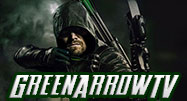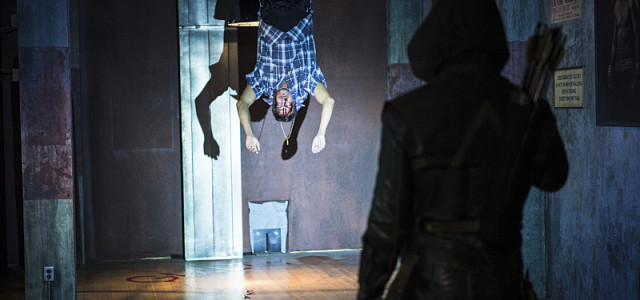
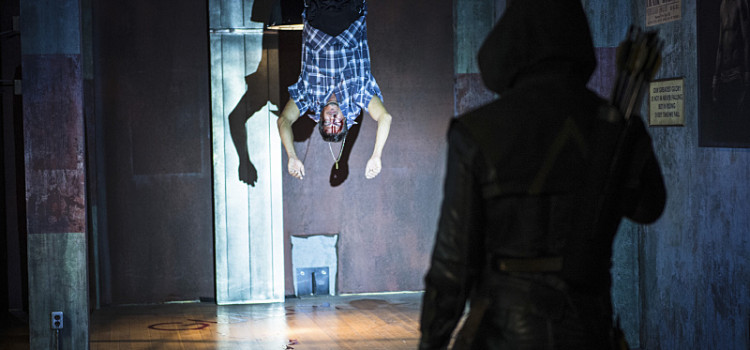
Arrow #3.6 “Guilty” Recap & Review
Recaps & Reviews November 17, 2014 Derek B. Gayle

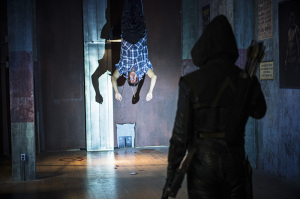 Summary: A heavy-handed, unsubtle episode still finds success in its themes and character development, plus a certain boxing glove arrow.
Summary: A heavy-handed, unsubtle episode still finds success in its themes and character development, plus a certain boxing glove arrow.
If you have not seen this episode yet and do not wish to be spoiled, do not continue reading!
Recap
After a body is found strung up in the Wildcat gym, Ted Grant becomes the main suspect. Oliver and Laurel argue over Ted’s innocence. Eventually, Ted reveals that he was once a vigilante in the Glades and had an apprentice, Isaac, who is after him. Isaac beat a drug dealer to death, and Ted abandoned Isaac as a result; now, he’s back for revenge. When Isaac kidnaps Laurel and Ted, Oliver and Roy come to the rescue and stop him. Meanwhile, Roy confides in Felicity that he dreamed of killing Sara. After doing tests, Felicity determines that it’s possible, and Roy confesses. Oliver learns from his experience with Ted and Isaac to not let go of and abandon his apprentices so quickly, as it would only make it worse, so he promises to not abandon Roy. Meanwhile, in flashbacks, when Maseo needs Oliver to remember where an informant for China White stashed key information, he asks Tatsu to help jog Oliver’s memory. He learns a meditation technique from her, and in the present, Oliver uses it on Roy. They realize that Roy did not kill Sara, but the brutality of her murder jogged Roy’s memory of the murder of a cop during his Mirakuru rampage. Then, when Isaac is being arrested, a woman named Cupid arrives and kills him.
Review
As the title implies, “Guilty” is a tale of guilt — guilt for things you’ve done, think you’ve done, or haven’t done but indirectly played a role in doing. It’s also the word explicitly written in blood under gruesome murder victims, and it’s a good signifier of how this episode presents its themes.The parallels are unusually unsubtle in “Guilty,” to a point where Roy verbatim tells Oliver “Don’t abandon me” mere seconds after being told by his apprentice foil Isaac that he’ll be abandoned.
Even so, we can’t disregard that those parallels exist. It’s still fair to say that episode is focused, at the very least, even if it’s damn upfront about what’s being focused on. It definitely gets the point across, even if it’s hammered in quite thick. But it does have a point, and it’s a point that gives this week’s central players all something to grapple with.
Roy, and his fear that he killed Sara, is of course a major player, and it’s a mixed bag. The biggest detriment of the Roy story comes from retrospect rather than “Guilty” itself. Season 3’s opening episodes have been extremely slow-burn and character-centric, with scarce story strewn together along a rather thin thread. Like Matt talked about in the review of last week’s episode, this is a stark contrast to the first two seasons’ remarkably dense, plot-heavy storytelling. Any time an episode has worked in season 3, it’s been because it followed up on previously established threads, using little tidbits we’ve learned about Oliver, Felicity, Laurel, and Thea to coalesce into a story about them, specifically. It’s made the opening of this season feel less confident than usual, but it’s also given the cast ample more to work with than just action fare.
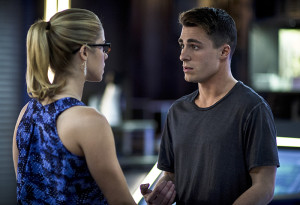 In Roy’s case, though, his main focus here is not drawing from much of the character information we’ve learned, but from the plots he was more incidentally involved in. There was quite a bit in seasons 1 and 2 about Roy’s ambition and obsession with vigilantism, plus his relationship with Thea, and that drive made him stand out among the cast at the time. Towards the end of season 2, however, he was shifted to be used as a plot point in the Mirakuru arc, his character beats mostly revolving around “trying to not succumb to rage.” He was a very strategic and necessary plot point, yes, but his Mirakuru rampage didn’t shine much light on Roy as a character, really.
In Roy’s case, though, his main focus here is not drawing from much of the character information we’ve learned, but from the plots he was more incidentally involved in. There was quite a bit in seasons 1 and 2 about Roy’s ambition and obsession with vigilantism, plus his relationship with Thea, and that drive made him stand out among the cast at the time. Towards the end of season 2, however, he was shifted to be used as a plot point in the Mirakuru arc, his character beats mostly revolving around “trying to not succumb to rage.” He was a very strategic and necessary plot point, yes, but his Mirakuru rampage didn’t shine much light on Roy as a character, really.
“Guilty” ends at a good place to explore the belated consequences of Roy’s Mirakuru rampage, finally noting that he killed a cop, which we’d noticed in previous roundtables should have been a bigger deal. So what’s to come with Roy will surely be better than what we get for him here, thankfully. But like just about everything else in season 3, that means “Guilty” is mostly set-up on its own, one that could rise or fall depending on how Roy’s story is carried out post-revelation. What we actually see isn’t about Roy’s guilt over his actions in “Seeing Red,” but the “what if” of Sara’s murder, and the building of his relationship with Oliver. It’s good that we’re finally at a point where we can address his actions in “Seeing Red,” but it doesn’t exactly make “Guilty” easy to pin down, because it all depends on how Oliver and Roy handle things from here on out. This is just another piece on the board, and it’s hard to figure out how well “Guilty” really works without seeing the whole picture. There’s always an element of that in a serialized drama, but since the bulk of Roy’s arc here was dealing with something that didn’t actually happen, its more likely to feel less important as time passes.
That Oliver comes to the conclusion that he can’t abandon Roy is very nice, and there’s a level of warmth that Oliver expresses that’s good to see. But there’s a major flaw in Oliver’s relief by the end: Roy still murdered someone. Stephen Amell plays Oliver much more content during their meditation — which makes sense because it’s meditation — but he continues be optimistic and almost beaming that he figured out the mystery. Roy’s reaction makes up for it; whether Roy killed Sara or not, he still murdered someone, and that’s a big deal. It may, perhaps, be addressed in the future, but right now Oliver looks rather selfish, and kind of like an idiot thinking things would be hunky-dory. It’s nice to not be so conflicted about a friend killing a friend, and that’s probably where that relief comes from. But that the team so easily glossed over the original murder, then faced a moral crisis when they thought he killed Sara, shows a major fallibility. Diggle talks big about justice and not letting their own off so easily, but what would really be different about Roy killing a cop on an unconscious rampage and Roy killing Sara on an unconscious rampage? If they didn’t let him loose then, why did they contemplate letting him loose now? Roy has every right to be even more freaked at the end, because honestly, it’d be easier to explain killing Sara to her loved ones than finding the family of this random cop and explaining it to them. There’s a strong level of hypocrisy underlying in Team Arrow, especially Oliver…and it goes even further, which we’ll get to in a moment.
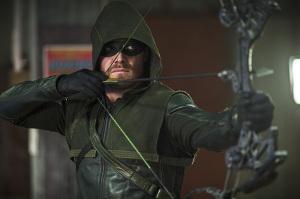 “Guilty” works better when its non-Roy story is taken into account. As overtly as the story of Ted Grant and his apprentice Isaac is meant to parallel Oliver and Roy, it still stands out on its own for a spotlight on Ted Grant. For a character so seemingly important in Laurel’s story, it’s helpful to flesh Grant out as more of a person, and “Guilty” does a decent job doing so. I’m not totally sold on J.R. Ramirez yet; he seems way too young in the role as a “retired” vigilante, and while his actual line readings are fine, he doesn’t have too much charisma. But Grant is a character worth keeping an eye on, nevertheless. Underplayed as it may be, it’s a big deal that Ted Grant was a masked vigilante six years ago, albeit one that never made much of a splash outside of the Glades. Even though Arrow and The Flash are presenting us with an early-birthed DC Universe, the presence of a retired Wildcat immediately expands the possibilities for scope. Could there have been superpowers before the particle accelerator explosion? How many other former vigilantes have there been? Grant still keeps things grounded — his mask is not at all flashy, and his only gimmick is the use of brass knuckles — but any future reveals of past generation heroes are now possible.
“Guilty” works better when its non-Roy story is taken into account. As overtly as the story of Ted Grant and his apprentice Isaac is meant to parallel Oliver and Roy, it still stands out on its own for a spotlight on Ted Grant. For a character so seemingly important in Laurel’s story, it’s helpful to flesh Grant out as more of a person, and “Guilty” does a decent job doing so. I’m not totally sold on J.R. Ramirez yet; he seems way too young in the role as a “retired” vigilante, and while his actual line readings are fine, he doesn’t have too much charisma. But Grant is a character worth keeping an eye on, nevertheless. Underplayed as it may be, it’s a big deal that Ted Grant was a masked vigilante six years ago, albeit one that never made much of a splash outside of the Glades. Even though Arrow and The Flash are presenting us with an early-birthed DC Universe, the presence of a retired Wildcat immediately expands the possibilities for scope. Could there have been superpowers before the particle accelerator explosion? How many other former vigilantes have there been? Grant still keeps things grounded — his mask is not at all flashy, and his only gimmick is the use of brass knuckles — but any future reveals of past generation heroes are now possible.
With Grant tied tightly in with Laurel, there’s significant material for her, too. This season has done a decent job at showing her progression as a potential vigilante without making unnatural leaps. She’s more courageous and ballsy, and is starting to target her rage in a productive direction, but she still has trouble sticking the landing more often than not. Her actions in the car chase are brave and smart, for example, but it still literally ends with a car crash. Oliver still gets to have his “carry away the damsel while walking away from an explosion moment,” but there’s a necessary difference when he rescues Laurel after she tried a risky move to rescue herself. She’s got a long way to go, but she proves Oliver right from their conversation at the end that she isn’t helpless, even if she does kinda need people looking out for her when she messes up.
One of the better elements of season 3 is the dynamic between Oliver and Laurel, which consistently sets them at odds but without betraying their friendship. They might be on two sides of the argument on any given episode — and both get very bitey about it this week — but there’s a mutual respect that keeps them from bordering on the venomous tiffs of season 2. As Laurel explicity states, “they used to date,” and they totally act like exes who ended on good terms. They fight like a married couple sometimes, but there isn’t any romantic spark or tension; they’re still friends, they still respect each other, but they aren’t afraid to call one another out on their bull. Stephen Amell and Katie Cassidy have much better chemistry in this type of relationship, where they can knock different points of view back and forth before reconciling at the end, even if they still end on different sides.
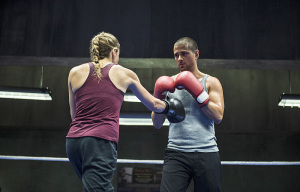 It’s quite necessary this week, as Oliver needs someone to call him out when generally acts like something of a contradictory dick. To be fair, his hypocritical anger that Grant beat one man to death, while Oliver’s countless murders go unmentioned, feels too manufactured. Yes, Oliver has always been a bit self-righteous, a character flaw that’s been admirable and frustrating at different points, but generally consistent. And a major part of his insistence here is his annoyance with Laurel’s involvement. So Oliver’s hypocrisy isn’t totally out of the blue, and after all, beating a man to death is different than Oliver’s self-defense or assassinations. But even with all that, the level of repetition and the frequency at which he re-emphasizes the point is another heavy-handed bit in an equally heavy-handed episode.
It’s quite necessary this week, as Oliver needs someone to call him out when generally acts like something of a contradictory dick. To be fair, his hypocritical anger that Grant beat one man to death, while Oliver’s countless murders go unmentioned, feels too manufactured. Yes, Oliver has always been a bit self-righteous, a character flaw that’s been admirable and frustrating at different points, but generally consistent. And a major part of his insistence here is his annoyance with Laurel’s involvement. So Oliver’s hypocrisy isn’t totally out of the blue, and after all, beating a man to death is different than Oliver’s self-defense or assassinations. But even with all that, the level of repetition and the frequency at which he re-emphasizes the point is another heavy-handed bit in an equally heavy-handed episode.
And that’s the biggest fault of the episode — if I haven’t been heavy-handed and unsubtle about it enough already — is that it just doesn’t ever stop hammering things in. Arrow is a loud and operatic show, but it still has the potential to be artful and quiet when it needs to be, and this is very much not that. But, again, that doesn’t mean the smarter parallels aren’t there, and “Guilty” works because it brings Roy, Ted, Laurel, and Oliver to necessary endpoints once the hour wraps up. Also, we finally get a version of the boxing glove arrow, and it’s super awesome and perfect and there’s absolutely no way to not be giddy about that.
Odds & Ends
- With Cupid’s arrival, every single episode this season sans “The Magician” has ended the episode with a cliffhanger leading directly into the next. It’s an easy (and let’s face it, kind of cheap) way to create the semblance of heavy serialization and “OMG!” cliffhanger moments even when there isn’t much plot progression going on. It hasn’t been a hindrance on the season, but Cupid’s appearance would generate more of a “huh?” for most viewers who aren’t familiar with the character or had heard of her arrival previously.
- Also, nice integration of Cupid into the crowd outside of the Wildcat gym. It’s about the most subtle thing the episode does (and that’s saying something considering how not-subtle that bright red hair is.)
- Another example of some of the unsubtley: the flashback doesn’t serve much of a purpose besides establishing the meditation techniques that Oliver uses on Roy, which is pretty obvious. It’s good that the flashback serves a purpose, but the story behind it (Oliver saw someone drop an envelope and reaaaaally needs to remember where it went) is a little strange. It’s nice that it brings Tatsu around to helping him, even reluctantly, though.
- I’m a little iffy on Brandon Nomura as Akio. Child actors are hard enough to get right, and then his character is supposed to be speaking English as a second language, so it’s hard to tell if he’s reading stiltedly sometimes because of the purposeful language barrier, or if he’s just not a very good child actor.
It’s really nice to see Felicity and Roy getting scenes together, especially when they’re confiding in one another. The downside of season 2’s density and pace was that characters moved quickly from one scene to another without spending much time together. As a result, Team Arrow has grown more closely off-screen than on, but this shows that, yes, they are friends and family as well as co-workers.- That said, Felicity’s snark went a little overboard in their initial scene together. Her quips were funny at first, but there was definitely dissonance as it went along, considering Colton Hayes played Roy as visibly distraught while Felicity just kept throwing in the sarcasm and remarks about it being a “waste of time.” Emily Bett Rickards played it up comedically as best she could, but the lines made her come off way more inexplicably cruel than it should have.
- So, Roy didn’t do it, but the way he described it matches the evidence. So either the real killer threw arrows too (unlikely), or…what, it’s a super short archer? She did say the height and way it was angled wasn’t normal for an archer.
- Felicity refers to “portable magnetic resonance imaging” to scan a body and generate a virtual autopsy. Normally I don’t mind technobabble, but this seemed more ridiculous than usual, not even just because I (indirectly) work with these kinds of units on a daily basis. She’s just talking about an MRI, plain and simple, and any normal person would call it an MRI. And the closest thing that exists to a “portable” MRI (at least that I know of, other than things that haven’t been invented yet) would just be, like, an MRI on a trailer. If she just had a smaller, lower-field MRI, then she wouldn’t even call it a portable MRI, she’d just call it an MRI. I guess she could use the images from an MRI to make a semblance of an autoposy, but the amount of time it would take to scan every part of the body and get all the appropriate views (and have all the right coils!) would probably take over a day without stopping. All that’s to say: technobabble is fine, but just make up words completely, or chalk it up to “QC’s R&D department has a nifty new body scanner.” If you throw out real, somewhat common knowledgey things, you’re just going to look a little silly.
- Oliver’s reaction to the Wildcat lair: “Mine’s bigger.” Talk about heavy-handed metaphors.
- “Arrows, brass knickles. Never understood why we couldn’t use a gun the way they did.” Great line.
A SECOND OPINION
by Matt Tucker
In a way, many stories, particularly superhero stories, are like fables. They have a moral or message to offer, told in a thoughtful, enlightening, or entertaining way. Arrow often deals in themes as a way to impart — or, at least, reflect — these life lessons. Every once in a while, an episode of the series gets so densely thematic that it drops on you like one of the Wildcat Gym heavy bags. Such as it is with “Guilty.”
The theme of the hour was to not lose faith in people and give up on them. This was exemplified in the relationship between Ted Grant and Isaac Stanzler, vigilante and wayward erstwhile sidekick, set adrift when Grant thought he’d done the unthinkable and walked away from his mask.
Lo and behold, there’s a crisis at Team Arrow at just this moment that puts Oliver and Roy at a similar crossroads. It’s layered on so thick that, at any point, the episode feels like it could drown in it. Even Diggle takes the absolute hardline with Oliver to cut bait on Roy before they can even verify with certainty that he was guilty of Sara’s murder.
This, of course, all on top of the conflict Oliver and Laurel are having once he discovers that she’s training with Grant. Just to make sure it’s not swallowed up in the oversized theme, Oliver gets exceedingly and obnoxiously self-righteous with Laurel over Grant and how he used to be a vigilante who killed someone! Pot, kettle. Kettle, pot. I think you know each other’s work.
Pointing out that the grandiosity of the soap opera was so huge this week — Laurel, I’m sorry I … killed your sister (dun, dun, duuunnnnnn!) — you could be forgiven for thinking I didn’t care for the episode. Quite the opposite. I enjoy when a show goes big in its themes if it sticks the landing. (Unlike Laurel, who made the bold move to spin the car to throw Stanzler out on the street, but failed to stick the landing when it careened straight into parked vehicles.)
The moment the masked puppy-eyed Roy, after showing up to save the day, turns to Oliver and utters the line “Please don’t abandon me,” the whole endeavor paid off.
It was an unexpected and unabashedly heartfelt moment, and it really did make the very strong parallels between Arrow & the newly coined Arsenal and Wildcat & un-monikered sidekick-what-went-demented hold depth and value. It’s going to have to trade on that because Roy faces a very significant uphill battle in coming to terms with his actions from last season. He may not have killed Sara but he was a murderer while Mirakuru mad. It was heartbreaking to see that realization swarm over him, necessary as it was for Oliver to reveal the truth.
There was much to like about this episode. We got to know more of Ted Grant, not just of his past, but more as a character, as an individual. The fact that he was a vigilante before Oliver’s quest flushes perfectly with their comic origins, and also works within the timeframe that Oliver was on Lian Yu and wouldn’t have heard anything about the Wildcat’s exploits. That he was crushed out of continuing on his crusade by the false belief that he’d killed someone says a lot about his integrity. That he left Stanzler in the wind to go full-on Jason Todd also speaks to his flaws.
While pouring himself into boxing after believing he’d bludgeoned a man to death with his fists might seem odd, the discipline, responsibility, and focus of the sport — not to mention what he gives back by hosting and training people at his gym — is a perfect outlet. It drove Grant to be a better person over the last six years and it’s what will make him the perfect trainer for Laurel.
He doesn’t get off scott-free. Grant did abandon Stanzler, not putting full thought into the circumstances and consequences of what they were doing. He might not have been guilty of the latest string of murders, but he was indirectly responsible and that should serve as motivation going forward, especially when he finds out Stanzler was killed by Cupid.
(I couldn’t have been the only one to notice Cupid standing at the end of the crowd at the gym the night they discover the body there, right? They quickly pan by her as Laurel walks through the scene on the way to meet Oliver to talk about Grant. I like subtle insinuation like that.)
Laurel with a purpose is always a good Laurel, and it’s great to see her channel herself into a funnelled direction. It would’ve been interesting to see what they would’ve done with her if they had revealed Sara’s killer so quickly, but something tells me she’s on a permanent course now. That’s only good for the character and for the show.
The hour was 244-point headline bold in its theme, but it served to give Roy new dramatic impetus, deepen Ted Grant as a character, further develop a resolved Laurel, and offer Oliver a deeper understanding and respect of his team and his responsibility to them. And it organically gave us the boxing glove arrow.
Yeah, I liked it.
Derek B. Gayle
Derek B. Gayle is a Virginia native with a BS in English, Journalism and Film from Randolph-Macon College. In addition to being an avid Power Rangers and genre TV fanatic, he also currently co-produces, writes and performs in local theatre, and critically reviews old kids' cartoons. You can check out his portfolio here.
Arrow Reunion: Calamity Jane Now Available on Tubi
News Jun 17, 2024
Bid on a Piece of Arrow (and Flash) History!
News May 22, 2024
Arrow Season 8 Blu-ray & DVD Coming April 28
News Feb 5, 2020
End of an Arrow: Thoughts on the Series & Finale
News Jan 28, 2020
